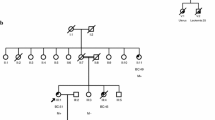Abstract
Recently, RECQL was reported as a new breast cancer susceptibility gene. RECQL belongs to the RECQ DNA helicase family which unwinds double strand DNA and involved in the DNA replication stress response, telomere maintenance and DNA repair. RECQL deficient mice cells are prone to spontaneous chromosomal instability and aneuploidy, suggesting a tumor-suppressive role of RECQL in cancer. In this study, RECQL gene mutation screening was performed on 1110 breast cancer patients who were negative for BRCA1, BRCA2, TP53 and PTEN gene mutations and recruited from March 2007 to June 2015 in the Hong Kong Hereditary and High Risk Breast Cancer Program. Four different RECQL pathogenic mutations were identified in six of the 1110 (0.54 %) tested breast cancer patients. The identified mutations include one frame-shift deletion (c.974_977delAAGA), two splicing site mutations (c.394+1G>A, c.867+1G>T) and one nonsense mutation (c.796C>T, p.Gln266Ter). Two of the mutations (c.867+1G>T and p.Gln266Ter) were seen in more than one patients. This study provides the basis for existing of pathogenic RECQL mutations in Southern Chinese breast cancer patients. The significance of rare variants in RECQL gene in the estimation of breast cancer risk warranted further investigation in larger cohort of patients and in other ethnic groups.

Similar content being viewed by others
References
Narod SA (2009) Modifiers of risk of hereditary breast and ovarian cancer. Nat Rev Cancer 2:113–123
Couch FJ, Nathanson KL, Offit K (2014) Two decades after BRCA: setting paradigms in personalized cancer care and prevention. Science 343:1466–1470
Miki Y, Swensen J, Shattuck-Eidens D, Futreal PA, Harshman K, Tavtigian S, Liu Q, Cochran C, Bennett LM, Ding W et al (1994) A strong candidate for the breast and ovarian cancer susceptibility gene BRCA1. Science 266:66–71
Wooster R, Bignell G, Lancaster J, Swift S, Seal S, Mangion J, Collins N, Gregory S, Gumbs C, Micklem G (1995) Identification of the breast cancer susceptibility gene BRCA2. Nature 378:789–792
Cybulski C, Carrot-Zhang J, Kluzniak W, Rivera B, Kashyap A, Wokolorczyk D, Giroux S, Nadaf J, Hamel N, Zhang S et al (2015) Germline RECQL mutations are associated with breast cancer susceptibility. Nat Genet 47:643–646
Sun J, Wang Y, Xia Y, Xu Y, Ouyang T, Li J, Wang T, Fan Z, Fan T, Lin B et al (2015) Mutations in RECQL gene are associated with predisposition to breast cancer. PLoS Genet 11:e1005228
Li H (2014) Toward better understanding of artifacts in variant calling from high-coverage samples. Bioinformatics 30:2843–2851
Li H, Handsaker B, Wysoker A, Fennell T, Ruan J, Homer N, Marth G, Abecasis G, Durbin R, 1000 Genome Project Data Processing Subgroup (2009) The sequence alignment/map format and SAMtools. Bioinformatics 25:2078–2079
DePristo MA, Banks E, Poplin R, Garimella KV, Maguire JR, Hartl C, Philippakis AA, del Angel G, Rivas MA et al (2011) A framework for variation discovery and genotyping using next-generation DNA sequencing data. Nat Genet 43:491–498
McLaren W, Pritchard B, Rios D, Chen Y, Flicek P, Cunningham F (2010) Deriving the consequences of genomic variants with the Ensembl API and SNP Effect Predictor. Bioinformatics 26:2069–2070
Kumar P, Henikoff S, Ng PC (2009) Predicting the effects of coding non-synonymous variants on protein function using the SIFT algorithm. Nat Protoc 4:1073–1081
Adzhubei I, Jordan DM, Sunyaev SR (2013) Predicting functional effect of human missense mutations using PolyPhen-2. Curr Protoc Hum Genet. doi:10.1002/0471142905.hg0720s76
Croteau DL, Popuri V, Opresko PL, Bohr VA (2014) Human RecQ helicases in DNA repair, recombination, and replication. Annu Rev Biochem 83:519–552
Popuri V, Hsu J, Khadka P, Horvath K, Liu Y, Croteau DL, Bohr VA (2014) Human RECQL1 participates in telomere maintenance. Nucleic Acids Res 42:5671–5688
Bernstein KA, Gangloff S, Rothstein R (2010) The RecQ DNA helicases in DNA repair. Annu Rev Genet 44:393–417
Chu WK, Hickson ID (2009) RecQ helicases: multifunctional genome caretakers. Nat Rev Cancer 9:644–654
Watt PM, Hickson ID, Borts RH, Louis EJ (1996) SGS1, a homologue of the Bloom’s and Werner’s syndrome genes, is required for maintenance of genome stability in Saccharomyces cerevisiae. Genetics 144:935–945
Kitao S, Shimamoto A, Goto M, Miller RW, Smithson WA, Lindor NM, Furuichi Y (1999) Mutations in RECQL4 cause a subset of cases of Rothmund–Thomson syndrome. Nat Genet 22:82–84
Hanada K, Hickson ID (2007) Molecular genetics of RecQ helicase disorders. Cell Mol Life Sci 64:2306–2322
Acknowledgments
This study was supported by Dr Ellen Li Charitable Foundation, Kerry Kuok Foundation, Health and Medical Research Fund (1123176) and Hong Kong Hereditary Breast Cancer Family Registry. We thank Fian B.F. Law, Bui K. Ip, Anthony T.C. Wong, Gigi Choy, Wing Pan Luk and Ling Hiu Fung from Hong Kong Sanatorium & Hospital for assisting in sequencing data processing and statistical analysis. We also like to thank Dr Dacita Suen, Dr Clement Chen, Dr KK Ma, Dr Lorraine Chow, Dr Annie Chu, Jennifer Siu, Desiree Tse, Winner Cheng and Wong Ling from Department of Surgery, The University of Hong Kong, and members of the Hong Kong Breast cancer research groups from Departments of Surgery and Oncology of contributing Hospitals in Hong Kong.
Author information
Authors and Affiliations
Corresponding author
Ethics declarations
Conflict of interest
The authors declare that they have no conflict of interest.
Ethical approval
All procedures performed in studies involving human participants were in accordance with the ethical standards of the institutional and/or national research committee and with the 1964 Helsinki declaration and its later amendments or comparable ethical standards.
Electronic supplementary material
Below is the link to the electronic supplementary material.
Rights and permissions
About this article
Cite this article
Kwong, A., Shin, V.Y., Cheuk, I.W.Y. et al. Germline RECQL mutations in high risk Chinese breast cancer patients. Breast Cancer Res Treat 157, 211–215 (2016). https://doi.org/10.1007/s10549-016-3784-1
Received:
Accepted:
Published:
Issue Date:
DOI: https://doi.org/10.1007/s10549-016-3784-1




